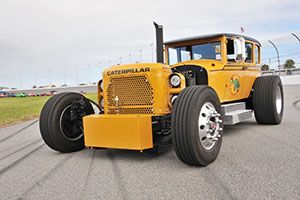Driving For Major Carriers With Sleep Apnea
Topic 19306 | Page 1

You might consider calling around to some of the companies that will hire an entry level driver. Maybe you have, sounds like you haven't though.
Explain to them you are already on a machine, comfortable with it and it's managing your condition effectively. Ask how they will handle your situation, get an answer from the direct source before jumping to any conclusions.

You might consider calling around to some of the companies that will hire an entry level driver. Maybe you have, sounds like you haven't though.
No, I have not. I'm at the early stages of the preliminary "do I want to get involved in this industry?" investigation.
I keep seeing references to a standard way of doing business (the carrier pays for things up front and repays themselves via payroll deduction) that appeals to the sort of guy who buys a TV from Rent-A-Center with weekly payments, but doesn't appeal to guys like me, and I'm wondering whether that sort of thing is going to be a non-issue, a minor annoyance, or a major nuisance to me.
Then there's the whole issue of the industry and its regulators getting involved with my health and medical care. It's necessary to a point, but that doesn't stop it from being annoying to me.

Taxman wrote:
No, I have not. I'm at the early stages of the preliminary "do I want to get involved in this industry?" investigation.
That's what I thought. Considering the importance of how a trucking company will handle your sleep apnea , I'd start there and work backwards. Obviously a show stopper for you, my suggestion resolve that question first.
The regulations on sleep apnea are obvious, rest is vital to safe performance. Fatigue is not a valid reason for an accident or critical event.
Place very little credence on what you hear and what you have read. A ton of misinformation exists and has taken on a life of its own, void of verifiable truth. Exactly the reason Brett started this website in the first place.
Sleep Apnea:
A physical disorder in which you have pauses in your breathing, or take shallow breaths, during sleep. These pauses can last anywhere from a few seconds to a few minutes. Normal breathing will usually resume, sometimes with a loud choking sound or snort.
In obstructive sleep apnea, your airways become blocked or collapse during sleep, causing the pauses and shallow breathing.
It is a chronic condition that will require ongoing management. It affects about 18 million people in the U.S.
If you have the money then pay upfront for the food, machine, equipment for the truck or whatever else and don't worry about the payroll deductions. There's nothing saying I HAD to buy my chains from prime...or the load locks from them. There is nothing saying I HAD to take the $200 per week advance for food.
A lot of people who come to the company schools do so because they were laid off or collecting unemployment, couldn't find work at home. Or..they already paid thousands of dollars to private CDL schools and failed the skills tests. That means for them money is tight. The OPTION to have advances is a benefit to them. What you are seeing as a slave labor type of thing is beneficial to some as a stepping stone to a career with pretty good earning potential.
Also costs of things are area relevant. I inquired about a sleep study/cpap with my USPS federal insurance....they wanted $1200 AFTER my insurance paid, just for the test. The prime test was $500 I think....maybe $600. The machine if I needed it was $500. So in NJ WITH insurance I would have paid double what I did at prime in MO without it. (Doesnt surprise me as cost of living is cheap there comoared to NJ). And I don't know about the modems on the cpaps, cause my doctors wanted me to bring the card in monthly which would have been another $40 per month for a specialist copayment. That was two years ago. You obviously know more about this than I do.
Call the companies like suggested.
CDL:
Commercial Driver's License (CDL)
A CDL is required to drive any of the following vehicles:
- Any combination of vehicles with a gross combined weight rating (GCWR) of 26,001 or more pounds, providing the gross vehicle weight rating (GVWR) of the vehicle being towed is in excess of 10,000 pounds.
- Any single vehicle with a GVWR of 26,001 or more pounds, or any such vehicle towing another not in excess of 10,000 pounds.
- Any vehicle, regardless of size, designed to transport 16 or more persons, including the driver.
- Any vehicle required by federal regulations to be placarded while transporting hazardous materials.
CPAP:
Constant Positive Airway Pressure
CPAP is a breathing assist device which is worn over the mouth or nose. It provides nighttime relief for individuals who suffer from Sleep Apnea.

I already had a CPAP machine when I came to Prime. It was a "home" machine that I also used on rigs while in the oilfield. Prime gave me the option of either routing to a terminal every so often or paying to have a modem installed. I chose the modem for $65, if I remember correctly, and a $2 deduction each week for monitoring.
Terminal:
A facility where trucking companies operate out of, or their "home base" if you will. A lot of major companies have multiple terminals around the country which usually consist of the main office building, a drop lot for trailers, and sometimes a repair shop and wash facilities.
CPAP:
Constant Positive Airway Pressure
CPAP is a breathing assist device which is worn over the mouth or nose. It provides nighttime relief for individuals who suffer from Sleep Apnea.
HOS:
Hours Of Service
HOS refers to the logbook hours of service regulations.
Thanks. Sounds like I should stop worrying about health and safety and worry more about driving and HR/Payroll issues.
I already have a great CPAP and full control of my OSA, even have a lighter socket laptop power supply that can handle my CPAP and humidifier, and it sounds like most companies will work reasonably with me to keep me healthy and safe. While I'd rather see the employer pay for safety monitoring, $100 a year isn't worth caring about.
Just curious, what make/model did they supply for Rainy, and what one were they able to modem uplink for Tastebuds?
CPAP:
Constant Positive Airway Pressure
CPAP is a breathing assist device which is worn over the mouth or nose. It provides nighttime relief for individuals who suffer from Sleep Apnea.
Sounds like I should stop worrying about health and safety and worry more about driving and HR/Payroll issues.
Why do you think you need to be worried about HR/Payroll issues?
Probably because of all the "starting deductions". Advances, sleep studies, CPAP , chains & locks, etc.
If you don't come with a boatload of $$ to pay for this stuff up front - you're going to have to keep a close eye on your paystubs to make sure the proper "advances" are being deducted. That's a lot to monitor.
Rick
CPAP:
Constant Positive Airway Pressure
CPAP is a breathing assist device which is worn over the mouth or nose. It provides nighttime relief for individuals who suffer from Sleep Apnea.
That makes sense. I guess I never had to deal with all that stuff.
I was hoping he hadn't scared himself by reading some crazy unsubstantiated claims online about being cheated on his pay.
New Reply:
New! Check out our help videos for a better understanding of our forum features

















Preview:
This topic has the following tags:
Advice For New Truck Drivers Choosing A Trucking Company DOT Physical DOT Physical Exemptions FMCSA Sleep Apnea







 TT On Facebook
TT On Facebook
(diverting the CPAP discussion from Michelle's 60 hour school thread. As a CPAP user, this discussion of apnea is of interest to me)
One major potential area of conflict between me and "the way we do business in this industry" is the entire concept of "we'll buy that for you and you can pay us back in 20 weekly installments". If I need lunch, I can pay for a couple of Whopper Jrs on my own. Likewise if I need a new CPAP or even a new 53' dry van. A new T680 is out of reach for my checkbook, so I just won't be buying one. So if a carrier wants to sell me a $883 CPAP for 20 weekly payments of $65 each, that's going to be a point of conflict.
These days, most CPAPs come with cellular modems. It's how the DMEs (Durable Medical Equipment suppliers) track compliance so that the insurance companies will pay for the machines (typical insurance deal is for the insurance company to lease it for xx months, after which the patient owns it, if the patient isn't using it, the insco doesn't want to keep paying for it), and it's also the way the factory feeds software updates to the machine. In home environments, this system breaks down when the home isn't in range of a compatible cell tower. In trucks, it's virtually guaranteed that every machine will see a compatible tower every day, as long as you leave it plugged in while you drive and don't put the machine in airplane mode. The lease my insurance company forces the DMEs into is a pretty good one, from the point of view of the insco and the patient anyway. The DME gets $76 a month for ten months, then the patient owns the machine.
In the normal world, the DMEs have full access to your machine as the authorized dealer who configured it in the first place. In the trucking world, the carriers will want their drivers on equipment that they can access the data stream from.
For me personally, I insist on a machine that logs not just the hours of usage but the results. I view my AHI every morning when I take the mask off, and would not use a machine that doesn't log apnea/hypoapnea events. I can use any machine on the market, I just insist on having a data capable machine that keeps me informed on my medical status. Other patients, like my Dad for example, might have medical needs that dictate a particular choice of machine.
Can anybody tell me what makes/models of CPAP specific major carriers have purchased for their drivers? Is it likely that a driver who is already on another brand of equipment could tell the carrier's safety team "here's my login and password for for the factory's patient portal, go there once a month and print out my compliance report"?
Over The Road:
Over The Road
OTR driving normally means you'll be hauling freight to various customers throughout your company's hauling region. It often entails being gone from home for two to three weeks at a time.
CPAP:
Constant Positive Airway Pressure
CPAP is a breathing assist device which is worn over the mouth or nose. It provides nighttime relief for individuals who suffer from Sleep Apnea.
Dm:
Dispatcher, Fleet Manager, Driver Manager
The primary person a driver communicates with at his/her company. A dispatcher can play many roles, depending on the company's structure. Dispatchers may assign freight, file requests for home time, relay messages between the driver and management, inform customer service of any delays, change appointment times, and report information to the load planners.Dry Van:
A trailer or truck that that requires no special attention, such as refrigeration, that hauls regular palletted, boxed, or floor-loaded freight. The most common type of trailer in trucking.HOS:
Hours Of Service
HOS refers to the logbook hours of service regulations.